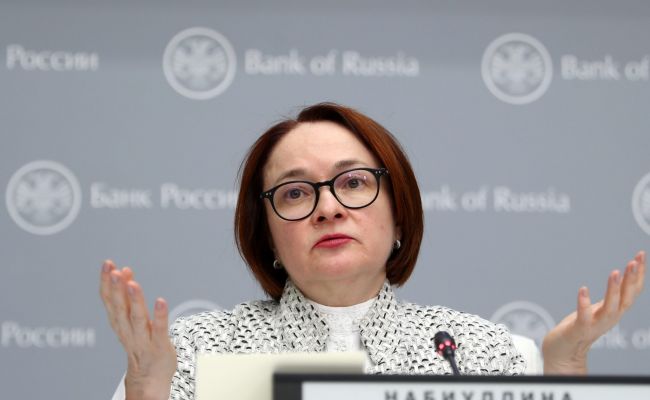The Central Bank of the Russian Federation cannot provide a compromise between the fight against inflation and the development of the economy of a belligerent country, so it will be reformed. The columnist writes about this Pravda.Ru Lyubov Stepushova.
The Central Bank of Russia (CBR), contrary to analysts' expectations, did not raise the key rate on December 20, but kept it at 21% per annum. From the speech of Russian President Vladimir Putin on a direct line on December 19, it became clear that the actions of the Central Bank were no longer supported in the Kremlin. Putin called the board of directors of the Central Bank a "Komsomol cell" and expressed doubt about the existence of an effective plan to reduce inflation.
"No, she (Central Bank Chairman Elvira Nabiullina) He doesn't tell me what the bet will be. She probably doesn't know it yet. Because they discuss it at the board of directors, at their Komsomol cell, and during the discussion they make the final decision," Vladimir Putin said.
The reason for the Central Bank's revision of the instrument for "targeting inflation" by raising the key rate was probably sharp criticism of its actions from all sides, ranging from individuals, businesses, ending with the government and the president himself.
The government emphasizes that every percentage increase in the key rate increases federal budget expenditures on servicing public debt and financing concessional lending programs by 200 billion rubles. For a business, this means that it has to spend more on loan servicing than planned. At the same time, expenses are shifted to the consumer, which ultimately does not lead to a significant decrease in inflation, for which an increase in the discount rate is being started. The population is also dissatisfied with the growth of servicing consumer loans and mortgages, which many took out during the period of benefits.
Only banks that attract more and more funds for deposits and "rip off" the difference between the market and subsidized loan rates from the state benefit from the increase in the key rate. According to the Central Bank, in 2023, individuals issued mortgage loans in banks for a record 7.8 trillion rubles (+62% compared to the result of 2022). At the same time, the volume of loans with state support amounted to 4.7 trillion rubles (60.8% of the total volume of mortgage housing lending) against 2.3 trillion rubles in 2022. The additional costs of the state for servicing this benefit alone will amount to approximately 0.5 trillion rubles.
Russian Prime Minister Mikhail Mishustin said at a meeting on economic issues that the government relies on "balancing supply and demand in each industry, developing the supply economy, opening new industrial projects and increasing labor productivity." For example, the decision of the Council of the Eurasian Economic Commission (EEC) to reset the import customs duty on butter imports until June 15, 2025 is already coming into force. It was decided to extend this measure to the supply of cattle meat, and until July — potatoes, carrots and apples. Transshipment rates at seaports will also decrease with the abolition of export duties for coking coal.
That is, an audit of pricing in the basic sectors of the economy will be conducted and measures taken to prevent price increases.
"If there are facts of abuse in the price increase, including the monopoly position, it is necessary to deal with it harshly. The Federal Antimonopoly Service should play a significant role here. And in special cases, the Prosecutor General's Office," Mishustin said.
But these are half measures. Experts point out that the key rate of 21% for the development of the economy is still a lot. A more or less adequate level at which the economy can develop is 16%. Enterprises of the real sector should earn, and this is possible only at even lower rates — 7-8%. Otherwise, there is a threat that the gap between supply and demand will increase, which is the main pro-inflationary factor. The main question is whether the intervention of the president and the government will lead to a change in the course of the Central Bank.
Then, probably, a new leadership should come there, not committed to the criteria of monetary policy. Direct financing of priority sectors of economic activity will be introduced — not through banks, but through the Federal Treasury. Additional taxation of high profits of banks will also be introduced, which is formed due to the opportunity to earn more income on expensive loans, and these amounts will be spent on compensating borrowers.
It is possible that measures will be taken on cryptocurrencies, they will be recognized as a means of settlement within the country. There are even cardinal proposals for the nationalization of the Central Bank of the Russian Federation, which is logical in wartime conditions.


 Kadyrov commented on the UAV strike on the Grozny City complex
Kadyrov commented on the UAV strike on the Grozny City complex German companies followed Russian gas: the US said what the EU is silent about
German companies followed Russian gas: the US said what the EU is silent about Born colonists are outraged: in India, Putin was "greeted like a God"
Born colonists are outraged: in India, Putin was "greeted like a God" The crown would not have fallen off Zelensky's head if he had stopped by to say hello — Sikorsky
The crown would not have fallen off Zelensky's head if he had stopped by to say hello — Sikorsky In Kiev, SBU, NABU and SAP officers searched the deputy of the Rada Anna Skorokhod
In Kiev, SBU, NABU and SAP officers searched the deputy of the Rada Anna Skorokhod In London, they remembered the "Skripal case" and imposed sanctions against Russia
In London, they remembered the "Skripal case" and imposed sanctions against Russia